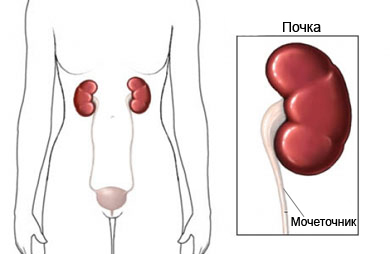Acute renal failure
Description of acute renal failure
Acute renal failure – sudden loss of kidney function. The kidneys purify the blood and regulate the fluid balance in the body. The disease is treated in a timely medical intervention, such as dialysis (procedure, which purifies the blood).

Causes of acute renal failure
There are many possible causes of kidney failure, since the renal system, there are three points of its occurrence: before entering the blood to the kidneys; within the kidney; and after, How to develop kidney urine enters the ureters.
Kidney failure can be caused by problems with the blood flow to the kidney, that may be caused by blood loss or dehydration. The reason could also be an infection, that interferes with the work of the kidneys.
The most common cause of kidney failure occurs in the kidney. It – acute tubular necrosis, cell death in the kidney, which work as filters blood. Cells die, when they are deprived of oxygen, often due to surgical complications or side effects of certain drugs. Physical problems, such as an enlarged prostate or kidney stones, that prevent, that urine is easily derived from the kidney into the ureters, It may also cause a sudden renal failure.
Risk factors for acute renal failure
Factors, which increase the risk of renal failure:
- The presence of chronic disease, such as diabetes, kidney disease, heart disease (eg, congestive heart failure), liver disease, or high blood pressure;
- Advanced age;
- Dehydration;
- Bleeding, especially from the gastrointestinal tract;
- Certain medications are potentially toxic to the kidney – eg, antibiotics, such as sulfa drugs, chemotherapy drugs, Radiation-contrast materials, and illicit drugs (eg, heroin);
- Complications after surgery or treatment in an intensive care unit;
- Abuse of certain non-prescription pain relievers, known as non-steroidal anti-inflammatory drugs (NSAIDs) – eg, Ibuprofen, naproxen sodium, or ketoprofen;
- Use of angiotensin converting enzyme (ACE);
- Obstructed urine causes (eg, benign prostatic hypertrophy, bladder tumor).
Symptoms of acute renal failure
Many patients have no symptoms, but sometimes symptoms may include the following:
- Swelling all over the body;
- Less frequent urination;
- Dark urine;
- Fatigue;
- Nausea and vomiting;
- General muscle weakness or muscle cramps;
- Anorexia;
- Metallic taste in mouth;
- In severe cases, coma or convulsions.
Diagnosis of acute renal failure
First, the doctor conducts a physical examination of the patient, and clarifies, whether he took drugs, and analyzes of blood and / or urine for signs of renal failure, including abnormal electrolytes, blood urea, nitrogen (AMK), creatinine (acid, which promotes the growth of muscles) , and red blood cells.
The amount of urine, which is produced within a few hours it may be regarded as a method of diagnosis, since kidney failure affects urine production. Urine also analyzed for color and atypical content, which may indicate the presence of infection. The nephrologist may also require you to spend US, CT, MRT, or examination for detection of bladder stones.
Treatment of acute renal failure
The method of treatment of renal failure depends on the exact cause and severity of the case. The doctor may recommend the following:
- Dialysis;
- Treatment of the obstruction with a catheter or stent;
- Maintaining the appropriate amount and ratio of blood fluids, intravenously;
- Stopping medications or drugs, which caused the loss of kidney function;
- Treatment issues, associated with kidney stones or infections;
- A limited protein intake, Controlled doctor.
Prevention of acute renal failure
To reduce the risk of acute renal failure, you must perform the following procedures:
- From time to time to pass a medical examination, including a check of renal function;
- Drink water and other fluids, to avoid dehydration;
- Do not take drugs or other substances, which can damage the kidneys. It is necessary to consult a doctor, to learn about the possible side effects of drugs taken;
- Individuals with a high risk for chronic kidney disease (eg, with pre-existing kidney disease or the presence of kidney stones) must undergo regular medical check-up.
